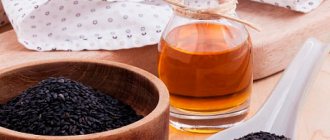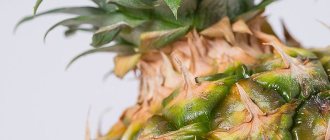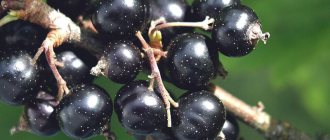The maternal instinct is very strong - even without certain knowledge, a woman intuitively tries to adhere to a healthy lifestyle during pregnancy so that the baby grows strong and strong. It is important not only to take tests on time, go to see a doctor and take vitamins. You need to monitor your diet to ensure that your food is fresh and varied. After all, the growth and development of the baby in the womb, his possible illnesses and possible health problems in the future depend on the mother’s diet. A properly selected diet is not only the basis for the healthy development of the fetus, but also the excellent well-being of the expectant mother. Some products can relieve serious diseases and conditions. The best way to restore immunity and protect yourself from colds and anemia is black currant. If you take it regularly, it is no worse than expensive medications and can cope with the problem that has arisen in the body. In this article we will talk about currants, their beneficial and harmful properties, we will find out how the berry affects the body of a pregnant woman and how to eat it correctly in order to get only benefits from currants.
The benefits of currants during pregnancy
According to doctors, expectant mothers can and should eat currants. Regular consumption helps slow down the aging process, improves memory, and helps the immune system produce antibodies such as T-lymphocytes, T-suppressor cells and T-helper cells.
During pregnancy, using currants you can solve the following problems without the use of medications:
- Strengthen the immune system for the beginning of the cold season, and reduce body hyperthermia. Vitamin C protects the body and helps fight viral infections.
- The recommended dose of berries will have a multivitamin effect and provide the mother and unborn baby with all the useful components.
- If the expectant mother is prone to anxiety, experiences depression, anxiety and depression, disaccharides will improve her mood, restore emotional balance and help her find peace.
- Diarrhea in pregnant women occurs no less often than constipation. Tanning components normalize intestinal function and relieve a woman from painful discomfort.
- The fruits of the bush have a diuretic effect, which is useful for those who have problems with edema. If the gynecologist has diagnosed swelling, it is necessary to begin a course of currant therapy.
- The berries contain a unique form of easily digestible iron, which helps avoid fetal hypoxia and anemia.
- If you have problems with blood pressure, currants will help normalize blood circulation and lower blood pressure.
You can eat currants at any stage of pregnancy, and in any trimester it will have a positive effect. In the early stages, it will relieve painful toxicosis, and restore the expectant mother’s appetite, and will also help to avoid colds during the formation of the baby’s especially important organs.
important In later stages, it is recommended to eat currants to reduce the load on the cardiac and vascular systems.
In the third trimester, various chronic diseases may worsen, and phytoncides create antibacterial, antiviral and anti-inflammatory protection.
What are the benefits of black and red currants for pregnant women?
Black currant contains vitamin C, B vitamins, and provitamin A, which is necessary for pregnant women. Sugars in currants are glucose and fructose. The composition is supplemented with glycosides, organic acids, flavonoids, and natural pectins. Among the mineral composition, the content of potassium and calcium is increased. In addition, the berry contains essential oils, which give the fruits and leaves a recognizable aroma. The black variety is recommended for pregnant women in the absence of contraindications as a product with multidirectional effects:
- For general strengthening of the immune system. Ascorbic acid, as the main element of the composition, helps prevent the development of viral infections.
- For saturation with various types of vitamins. The complex of components is diverse: calcium, potassium, and magnesium are needed to strengthen bones; iron, phosphorus, and magnesium are useful to improve blood counts.
- To normalize the digestive system. The tanning components of black currant help relieve flatulence and bloating.
- To normalize blood pressure. This property of black currant is considered especially important during late pregnancy.
- To improve blood counts, improve brain activity. The components of the composition influence the condition of blood vessels, prevent their fragility, increasing elasticity.
The red variety is also rich in vitamins and minerals. In addition, it contains vitamin E, among minerals the content of potassium, calcium, and phosphorus is increased. Red currant, in the absence of contraindications, is especially useful in the early stages of pregnancy; it contains slightly less ascorbic acid than black currant, but has an increased content of vitamins PP and vitamin A, which is especially important for women with a short term.
Fruits, when taken in doses and regularly, can be a prophylactic agent that prevents anemia and fetal hypoxia during pregnancy. Red currant juice helps reduce discomfort during pregnancy toxicosis; take it 1 tsp. after meals every day.
The benefits of black currant during pregnancy
One of the most useful berries, among its relatives, can bring invaluable benefits to the body. The low-calorie product is rich in natural protein, B vitamins, potassium, magnesium, calcium and copper. In addition to such a rich composition, currants contain pectins, essential oils and acids that have a positive effect on intrauterine development. Traditional medicine recommends consuming black fruits of the bush for the following symptoms:
- Problems with the stomach and intestines.
- Prevention of heart disease.
- Impaired kidney function.
- Restoring brain function.
- Impaired visual acuity.
- Weak immune system.
information Blackcurrant in the first half of pregnancy will support the health of the expectant mother and will not allow viruses to attack the body with a weakened immune system. In the second half, natural therapy will protect the heart and blood vessels from stress, restore the functioning of the kidneys and other internal organs.
Compound
Western Europe is considered the birthplace of red currants. Since ancient times, sour berries have been a recognized remedy in the fight against colds, some diseases of the kidneys and digestive tract. Traditional healers recommended red currants to pregnant women for various ailments. Currently, the plant is grown everywhere in gardens and summer cottages, including in Russia.
The composition of red currant berries includes:
- vitamins A, B1, B2, B9, C, K, P;
- mineral elements: selenium, iron, magnesium, potassium, sodium, manganese;
- pectin compounds;
- organic acids (succinic, malic);
- tannins;
- antioxidants.
The calorie content of fresh berries is no more than 40 kcal, dried - up to 285 kcal. Pregnant women should give preference to fresh and frozen berries. Addiction to dried currants, canned food and berry jam can lead to rapid weight gain and the appearance of concomitant pathologies.
The benefits of red currants during pregnancy
Red currants have no contraindications and do not cause allergies, so they can be consumed without fear. The beneficial characteristics of the fruit include the following:
- The high content of pectin helps ease the process of bowel movements and prevent chronic constipation.
- The sour taste will help cope with toxic poisoning, eliminate headaches, and relieve weakness.
- The low-calorie product helps fight excess weight.
- The juice of ripe fruits copes with high temperatures no worse than paracetamol.
information Until the 12th week, expectant mothers often feel nausea and lack of appetite. Toxicosis is very dangerous during pregnancy, and eating red currants will help reduce its acute manifestations.
It is possible and necessary
And yet yes. Currants are incredibly useful for almost everyone - from young to old, and pregnant women in this sense are no exception. Scientists say that the composition of this berry is many times superior to other relatives, which means that its benefits are undeniable! Many gynecologists almost by order prescribe currants to their pregnant patients, mainly for the prevention of anemia, swelling and colds. Not only fresh berries and their juice are useful, but also compotes, fruit drinks, jam and even leaves with branches - they make a very tasty healing tea. A valuable quality of black currant is that the beneficial properties of the berry are preserved even after exposure to very high and very low temperatures, that is, frozen and boiled berries are just as healthy as fresh ones.
More on the topic
Is it possible to eat currants during pregnancy, and how to do it correctly?
Berries during pregnancy
Is it possible to eat watermelon during pregnancy?
Is rosehip useful during pregnancy and how to use it?
Is it possible to eat blackberries during pregnancy?
During pregnancy, currants can stop diarrhea (it thickens stool), eliminate swelling (promotes the removal of fluid from the body), increase immunity and speed up recovery from seasonal viral diseases (the berry is especially rich in vitamin C), reduce high blood pressure (this applies to fresh berries and infusion of leaves), cleanse the intestines of toxins (thanks to pectins), improve the functioning of the cardiovascular system and respiratory tract. Doctors recommend using different parts of the currant bush during pregnancy, after childbirth (only with breastfeeding - with caution), for colds (especially sore throat), kidney diseases, Addison's and Alzheimer's disease, for poisoning, skin diseases, bleeding gums, hypertension, atherosclerosis , high cholesterol, rheumatism, gout, loss of strength, exhaustion. By the way, currants are also good for the brain and good mood: it improves mental abilities in old age and prevents the development of depression. It is recommended that people prone to diabetes and cancer pay special attention to fresh currants as a preventive measure.
And all thanks to the rich composition for which this berry is famous among folk healers and ordinary people. This is a whole range of vitamins (A, B, C, D, K, P, PP), macro- and microelements (calcium, magnesium, sodium, potassium, iron, fluorine, boron, phosphorus, copper, silver, zinc, manganese, molybdenum , cobalt, sulfur, lead, ), as well as essential oil, phosphoric acid, flavonoids, phytoncides, pectins, tannins, sugars.
Harm and contraindications of currants for pregnant women
As such, there are no contraindications to the fruits of the bush, except for individual intolerance, manifested by allergies. Intolerance can manifest itself not only to fruits, but also to preserves, jams, and decoctions of leaves and buds.
Don't forget that black currants have a tanning effect, which can aggravate constipation problems. If you have gastritis or have been diagnosed with a stomach ulcer, eating sour fruits is prohibited, as an exacerbation may occur. Expectant mothers with varicose veins and increased blood clotting are prohibited from eating berries of any kind.
You should eat berries with caution in the third trimester, and it is not recommended to exceed the indicated dose, as this can lead to premature birth.
Methods of use
use this product in any form . Frozen currants retain all the beneficial substances and properties. Various drinks are made from it - juice, mousse, fruit drink. Such drinks will complement the main diet of a pregnant woman.
The plant will also serve as a good addition to cottage cheese or yogurt. You can add both fresh and frozen berries to fermented milk products; they add a special piquancy to desserts.
You can prepare currant desserts, for example, sherbet, jelly, jelly. When preparing these desserts, you need to pay attention to the amount of sugar - you need to put in very little, or not at all.
You can also make tea from currant leaves, which will be useful during pregnancy due to its vitamins and nutrients. This tea helps remove toxins from the body.
Important! You can also make marmalade, jam, or add it to baked goods from currants. But such dishes are high in calories and are not healthy for pregnant women.
Summing up
Only ripe, juicy and aromatic berries will bring real health benefits. Choosing one is not at all difficult. Black currants must be dry, intact, free from defects, and have a strong odor. Red berries, unlike black ones, are sold on thin branches and must be whole, without rotten fruits. The red fruits resemble small pomegranates, just as red and slightly transparent.
important You can eat currants in any form: fresh, sprinkled with sugar, in the form of jam, preserves, or compote. In any form, the fruits retain their positive properties and are beneficial at different stages of pregnancy. Doctors do not advise overusing the fruits, and consume no more than 30 berries daily.
General information about red currants
Perennial red currant bushes reach one and a half meters in height and grow quite compactly. The berry can be found in different climatic regions, but the flowering and fruiting of shrubs varies.
Red currant bushes usually bloom after mid-May, closer to summer. Berries tightly collected in clusters begin to fill with juice only in the first half of July.
It is noteworthy that red currants hardly fall off, which is why they are usually collected with twigs . Further processing also does not always require picking the berries.
Red currants are tolerant of weather changes and seasonal cold snaps. However, in particularly dry summers, it is advisable to water it more often so that the berries are not very small. In winter, bushes are usually tied and covered with film to prevent freezing.
Red currants contain such an amount of vitamins and microelements that just 1 glass of it a day provides the human body with a daily dose of essential nutrients.











